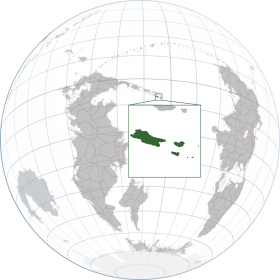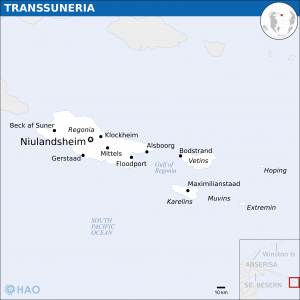Transsuneria (Pacifica): Difference between revisions
No edit summary |
No edit summary |
||
| Line 1: | Line 1: | ||
{{Infobox country | {{Infobox country | ||
|micronation = <!--yes if a micronation--> | |micronation = <!--yes if a micronation--> | ||
|conventional_long_name = Republic of Transsuneria <!--Formal or official full name of the country in English--> | |conventional_long_name = Federal Republic of Transsuneria <!--Formal or official full name of the country in English--> | ||
|native_name = ''Transsunerias | |native_name = ''Transsunerias bundrepublik'' ([[Transsunerian language (Pacifica)|Transsunerian]]) <!--Country's name (usually full name) in its native language, hence in italics (double quotemarks)--> | ||
|common_name = Transsuneria <!--Common name in English (used for wikilinks, captions, and to produce a default iso3166 code)--> | |common_name = Transsuneria <!--Common name in English (used for wikilinks, captions, and to produce a default iso3166 code)--> | ||
|status = <!--Status of country, especially useful for micronations--> | |status = <!--Status of country, especially useful for micronations--> | ||
| Line 63: | Line 63: | ||
|sovereignty_type = Establishment<!--Brief description of country/territory's status ("Independence [from...]", "Autonomous province [of...]", etc)--> | |sovereignty_type = Establishment<!--Brief description of country/territory's status ("Independence [from...]", "Autonomous province [of...]", etc)--> | ||
|established_event1 = [[Kieltan tribes (Pacifica)|Kieltan tribes]] settle in Transsuneria | |established_event1 = [[Kieltan tribes (Pacifica)|Kieltan tribes]] settle in Transsuneria | ||
|established_date1 = c. | |established_date1 = c. 1100 BC | ||
|established_event3 = Colonised by [[Gianlucian Kingdom (Pacifica)|Gianlucian Kingdom]] and several other nations | |||
|established_date3 = Late 1400s | |||
|established_event3 = Colonised by [[ | |||
|established_date3 = | |||
|established_event4 = Independence of [[Regonia (Pacifica)|Regonia]] | |established_event4 = Independence of [[Regonia (Pacifica)|Regonia]] | ||
|established_date4 = 1888 | |established_date4 = 1888 | ||
| Line 76: | Line 74: | ||
|established_event7 = Second republic established | |established_event7 = Second republic established | ||
|established_date7 = 1956 | |established_date7 = 1956 | ||
|established_event8 = | |established_event8 = Federal republic established | ||
|established_date8 = 2015 | |established_date8 = 2015 | ||
<!--......--> | <!--......--> | ||
| Line 140: | Line 138: | ||
|footnotes = <!--For any generic non-numbered footnotes--> | |footnotes = <!--For any generic non-numbered footnotes--> | ||
}} | }} | ||
'''Transsuneria''' ([[Transsunerian language (Pacifica)|Transsunerian]]: ['tɹɑːns.suːneːʁje]), officially the '''Republic of Transsuneria''' (Transsunerian: ''Transsunerias | '''Transsuneria''' ([[Transsunerian language (Pacifica)|Transsunerian]]: ['tɹɑːns.suːneːʁje]), officially the '''Federal Republic of Transsuneria''' (Transsunerian: ''Transsunerias bundrepublik'' ['tɹɑːns.suːneːʁjes 'bund.ɹeːbuːblik]), is an archipelagic state located in the extreme of the Cordilian archipelago. It is composed of the islands Regonia, Vetins, and Karleins, and several islets. The climate is tropical and the islands are exposed to yearly storms and hurricanes. The nation's name means "beyond Suneria", but what exactly was called Suneria is no longer known. A popular movement is working for a name change to Regonia. | ||
<!-- Not much is known about Transsuneria's early history, but it is certain several nomadic peoples (hunter-gatherers) inhabited the islands periodically but had disappeared until colonists started settling them. The inhabitants today are the descendants of the many nationalities settling the islands from around 1500 and onwards, and their contemporary official language (officially Transsunerian, or just Regonian) is a mix of at least three languages. Transsuneria is currently recovering from several decades of civil war.--> | <!-- Not much is known about Transsuneria's early history, but it is certain several nomadic peoples (hunter-gatherers) inhabited the islands periodically but had disappeared until colonists started settling them. The inhabitants today are the descendants of the many nationalities settling the islands from around 1500 and onwards, and their contemporary official language (officially Transsunerian, or just Regonian) is a mix of at least three languages. Transsuneria is currently recovering from several decades of civil war.--> | ||
Revision as of 16:30, 28 November 2021
Federal Republic of Transsuneria Transsunerias bundrepublik (Transsunerian) | |
|---|---|
Motto: "Hoping, opering, foetur" "Hope, sacrifice, future" | |
Anthem: Guldene Land Golden Land | |
 | |
 | |
| Location | Location of Transsuneria |
| Capital | Niulandsheim 6°46'48"S 5°6'36"W |
| Largest city | Floodport |
| Official languages | Transsunerian |
| Ethnic groups | 51% Nul 37% Forinsel 12% other |
| Religion | 88% Christian 12% Other/unknown |
| Demonym(s) | Transsunerian |
| Government | Federal presidential republic |
• President | Emil Palmann |
• Speaker of the Parliament | Rebeke Theodor |
| Legislature | Fellesparlament |
| Establishment | |
• Kieltan tribes settle in Transsuneria | c. 1100 BC |
• Colonised by Gianlucian Kingdom and several other nations | Late 1400s |
• Independence of Regonia | 1888 |
• Independence of Forinsel | 1904 |
• Unification of Regonia and Forinsel | 1905 |
• Second republic established | 1956 |
• Federal republic established | 2015 |
| Area | |
• Total | 5,333 km2 (2,059 sq mi) |
• Water (%) | negligible |
| Population | |
• 2019 census | 1,003,504 |
• Density | 188/km2 (486.9/sq mi) |
| GDP (nominal) | 2019 estimate |
• Total | $20.637 billion |
• Per capita | $20,565 |
| Gini | 35.1 medium |
| HDI | high |
| Currency | Transsunerian Dollara (TSD) |
| Time zone | UTC |
| Date format | dd/mm/yyyy CE |
| Driving side | right |
| Calling code | +118 |
| Internet TLD | .ts |
| |
Transsuneria (Transsunerian: ['tɹɑːns.suːneːʁje]), officially the Federal Republic of Transsuneria (Transsunerian: Transsunerias bundrepublik ['tɹɑːns.suːneːʁjes 'bund.ɹeːbuːblik]), is an archipelagic state located in the extreme of the Cordilian archipelago. It is composed of the islands Regonia, Vetins, and Karleins, and several islets. The climate is tropical and the islands are exposed to yearly storms and hurricanes. The nation's name means "beyond Suneria", but what exactly was called Suneria is no longer known. A popular movement is working for a name change to Regonia.
The Transsunerian economy is mainly based on phosphate mining, fishing, and petroleum refinement.
Etymology
History
It is uncertain whether there were permanent settlements in Transsuneria before the arrival of Kieltan tribes of Catzyan descent during the Cordilian Iron Age. The earliest mention in written sources of the Kieltans is in the works of the Sedunnic explorer Tynn Lierjnienn from 907. The Kieltan tribes remained semi-nomadic until the middle ages, when traders from Besern and Gianlucian Kingdom started settling the Transsunerian archipelago, greatly influencing the Kieltan culture and language. The Gianlucians expanded their influence and eventually officially colonised the smaller islands to the north-east. In the late 1400s, Sedunnic traders established a permanent presence on Regonia. During the first half of the 1500s, Austral and Boreal merchants started settling in Transsuneria.
In 1888, Regonia gained its independence. In 1904, the Gianlucian colony, as well as the other Forinseler islands, were granted independence after having agreed to lease the port of Bodstrand, Vetins, to the Gianlucian Empire, allowing for a continued substantial presence of the Gianlucian navy in the region. In 1905, the separate islands unified into a single state that was named Transsuneria.
Transsuneria was invaded by the Frankist Gianlucian Empire early during during the Great War and was completely occupied in five days. Transsuneria held great strategic value, especially for maintaining the supply lines to Gianlucian possessions in Bailtem and for the planned invasion of Besern.


